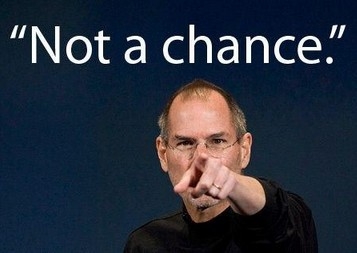When a guy from the facilities team went to Jobs’s office to pack up his belongings, he saw a picture frame on the floor. It contained a photograph of Jobs and Sculley in warm conversation, with an inscription from seven months earlier: “Here’s to Great Ideas, Great Experiences, and a Great Friendship! John.” The glass frame was shattered. Jobs had hurled it across the room before leaving. From that day, he never spoke to Sculley again.
當后勤部門的一個家伙去喬布斯辦公室整理他的物品時,發(fā)現(xiàn)地上有一個相框。里面是一張照片,照片上喬布斯和斯卡利正在熱烈交談,下面的題詞是7個月前寫的——“致偉大的想法、偉大的經(jīng)歷,和一段偉大的友誼!約翰”。玻璃鏡框已被摔碎。喬布斯在離開時把它扔到了地上。從那天起,他再沒有跟斯卡利說過一句話。
Apple’s stock went up a full point, or almost 7%, when Jobs’s resignation was announced. “East Coast stockholders always worried about California flakes running the company,” explained the editor of a tech stock newsletter. “Now with both Wozniak and Jobs out, those shareholders are relieved.” But Nolan Bushnell, the Atari founder who had been an amused mentor ten years earlier, told Time that Jobs would be badly missed. “Where is Apple’s inspiration going to come from? Is Apple going to have all the romance of a new brand of Pepsi?”
蘋果公司宣布喬布斯辭職的消息后,其股價立刻上漲了1美元,漲幅接近7%。“東海岸的股東總是擔心這些不靠譜的加利福尼亞人來經(jīng)營公司,”一位科技股票通訊的編輯解釋說,“現(xiàn)在,沃茲尼亞克和喬布斯都走了,這些股東都松了口氣。”然而雅達利公司的創(chuàng)始人、10年前便成為喬布斯良師益友的諾蘭·布什內(nèi)爾對《時代》雜志表示,他們會非常想念喬布斯。“蘋果的靈感將從哪里來?百事可樂味道的蘋果還能有美妙的傳奇嗎?”
After a few days of failed efforts to reach a settlement with Jobs, Sculley and the Apple board decided to sue him “for breaches of fiduciary obligations.” The suit spelled out his alleged transgressions:
幾天后,雙方仍然未能達成一致,斯卡利和蘋果公司董事會決定起訴喬布斯,稱其“違背受托義務”。該訴訟清楚地列出了喬布斯被指控的罪狀:
Notwithstanding his fiduciary obligations to Apple, Jobs, while serving as the Chairman of Apple’s Board of Directors and an officer of Apple and pretending loyalty to the interests of Apple . . .
作為蘋果公司的董事長和領導者,喬布斯理應忠于蘋果公司的利益,但他不顧對蘋果公司負有的受托義務……
secretly planned the formation of an enterprise to compete with Apple;
(a)暗中計劃組建一家公司與蘋果公司競爭;
(b) secretly schemed that his competing enterprise would wrongfully take advantage of and utilize Apple’s plan to design, develop and market the Next Generation Product . . .
(b)暗中策劃其競爭企業(yè)不正當?shù)乩锰O杲公司的計劃來設計、開發(fā)和營銷新一代產(chǎn)品……
(c) secretly lured away key employees of Apple.
(c)暗中挖走蘋果公司的重要員工……
At the time, Jobs owned 6.5 million shares of Apple stock, 11% of the company, worth more than $100 million. He began to sell his shares, and within five months had dumped them all, retaining only one share so he could attend shareholder meetings if he wanted. He was furious, and that was reflected in his passion to start what was, no matter how he spun it, a rival company. “He was angry at Apple,” said Joanna Hoffman, who briefly went to work for the new company. “Aiming at the educational market, where Apple was strong, was simply Steve being vengeful. He was doing it for revenge.”
當時,喬布斯擁有650萬股蘋果股票,占該公司的11%,價值超過1億美元。他立即開始賣出自己的股票。僅僅5個月,他就將所有的蘋果股票都賣掉了,只留下了1股,這樣如果自己愿意,就能參加股東會議。憤怒讓喬布斯拼命想要創(chuàng)辦一家蘋果公司的——無論他如何以他的方式描述這個故事——競爭企業(yè)。“他對蘋果很氣憤。”加入新公司的喬安娜·霍夫曼表示。“蘋果在教育市場已經(jīng)很強,新公司針對該市場只是因為史蒂夫的報復心和憤懣。他這么做都是為了復仇。”
Jobs, of course, didn’t see it that way. “I haven’t got any sort of odd chip on my shoulder,” he told Newsweek. Once again he invited his favorite reporters over to his Woodside home, and this time he did not have Andy Cunningham there urging him to be circumspect. He dismissed the allegation that he had improperly lured the five colleagues from Apple. “These people all called me,” he told the gaggle of journalists who were milling around in his unfurnished living room. “They were thinking of leaving the company. Apple has a way of neglecting people.”
當然,喬布斯不這么認為。“我沒有任何挑釁的意思。”他對《新聞周刊》說。喬布斯再次把自己最偏愛的記者邀請到伍德賽德的家中,這一次,他沒有叫安迪·坎寧安過來勸自己保持謹慎。他駁斥了蘋果公司的指控——不正當?shù)貜奶O果公司引誘5名員工。“這些人都給我打過電話。”他告訴那些在他的空屋子里來回轉(zhuǎn)悠的記者,“他們早就考慮離開蘋果公司。蘋果公司總能忽視人。”
He decided to cooperate with a Newsweek cover in order to get his version of the story out, and the interview he gave was revealing. “What I’m best at doing is finding a group of talented people and making things with them,” he told the magazine. He said that he would always harbor affection for Apple. “I’ll always remember Apple like any man remembers the first woman he’s fallen in love with.” But he was also willing to fight with its management if need be. “When someone calls you a thief in public, you have to respond.” Apple’s threat to sue him was outrageous. It was also sad. It showed that Apple was no longer a confident, rebellious company. “It’s hard to think that a $2 billion company with 4,300 employees couldn’t compete with six people in blue jeans.”
他決定與《新聞周刊》合作一篇封面報道,說出自己的故事。他在這次采訪中真情流露。“我最擅長的就是發(fā)現(xiàn)一批天才,然后和他們一起創(chuàng)造東西。”他告訴《新聞周刊》說。他表示,自己對蘋果會永遠懷有感情。“我會永遠記得蘋果,就像所有男人都會記得自己愛上的第一個女人那樣。”但是,如果有必要,他也愿意反抗蘋果公司的管理層。“如果有人公開說你是賊,那你就得作出回應。”蘋果公司威脅控告喬布斯及其同事的行為太過分,也令人傷心。這表明,蘋果不再是一家自信、叛逆的公司。“很難想象,一個市值20億美元、擁有4300名員工的公司,會競爭不過6個穿牛仔褲的人。”
To try to counter Jobs’s spin, Sculley called Wozniak and urged him to speak out. “Steve can be an insulting and hurtful guy,” he told Time that week. He revealed that Jobs had asked him to join his new firm—it would have been a sly way to land another blow against Apple’s current management—but he wanted no part of such games and had not returned Jobs’s phone call. To the San Francisco Chronicle, he recounted how Jobs had blocked frogdesign from working on his remote control under the pretense that it might compete with Apple products. “I look forward to a great product and I wish him success, but his integrity I cannot trust,” Wozniak said.
為了反擊喬布斯,斯卡利找到沃茲尼亞克,勸他站出來說話。沃茲尼亞克從來沒有控制欲和報復心,但是他也從不猶豫誠實地談論自己的感受。“史蒂夫是一個會侮辱人、傷害人的家伙。”他的話登上了那一周的《時代》雜志。他透露,喬布斯曾打過電話找他,要他加入自己的新公司——這本來是狡猾的一招,用以進一步打擊蘋果公司當前的管理層——但是沃茲尼亞克表示,自己不想成為這種游戲的一部分,他也沒有回復喬布斯的電話。根據(jù)《舊金山紀事報》(FranciscoChronicle)的報道,沃茲尼亞克講述了喬布斯曾經(jīng)以可能會與蘋果產(chǎn)品造成競爭為幌子,阻止青蛙設計公司參與他的遠程遙控器項目。“我期待他們能做出偉大的產(chǎn)品,我也祝愿他成功,但是我不信任他的人品。”沃茲尼亞克告訴這家報紙——
注釋:
①丹尼爾·M·盧因,數(shù)學家和企業(yè)家,是阿卡邁科技公司(AkamaiTechnologies)的聯(lián)合創(chuàng)始人。
②克拉克·肯特,超人作為地球人所使用的名字。











